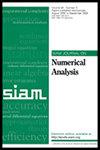An Equilibrated Flux A Posteriori Error Estimator for Defeaturing Problems
IF 2.9
2区 数学
Q1 MATHEMATICS, APPLIED
引用次数: 0
Abstract
SIAM Journal on Numerical Analysis, Volume 62, Issue 6, Page 2439-2458, December 2024.Abstract. An a posteriori error estimator based on an equilibrated flux reconstruction is proposed for defeaturing problems in the context of finite element discretizations. Defeaturing consists in the simplification of a geometry by removing features that are considered not relevant for the approximation of the solution of a given PDE. In this work, the focus is on a Poisson equation with Neumann boundary conditions on the feature boundary. The estimator accounts both for the so-called defeaturing error and for the numerical error committed by approximating the solution on the defeatured domain. Unlike other estimators that were previously proposed for defeaturing problems, the use of the equilibrated flux reconstruction allows us to obtain a sharp bound for the numerical component of the error. Furthermore, it does not require the evaluation of the normal trace of the numerical flux on the feature boundary: this makes the estimator well suited for finite element discretizations, in which the normal trace of the numerical flux is typically discontinuous across elements. The reliability of the estimator is proven and verified on several numerical examples. Its capability to identify the most relevant features is also shown, in anticipation of a future application to an adaptive strategy.
失效问题的平衡通量后验误差估算器
SIAM 数值分析期刊》,第 62 卷第 6 期,第 2439-2458 页,2024 年 12 月。 摘要。在有限元离散化的背景下,提出了一种基于均衡通量重构的后验误差估算器,用于失效问题。去耦包括通过去除与给定 PDE 近似解无关的特征来简化几何体。在这项工作中,重点是特征边界上具有诺伊曼边界条件的泊松方程。该估计器既考虑了所谓的失效误差,也考虑了在失效域上近似求解时产生的数值误差。与之前针对击穿问题提出的其他估算器不同,平衡通量重构的使用使我们能够获得误差数值部分的尖锐边界。此外,它不需要评估特征边界上数值通量的法线轨迹:这使得该估计器非常适合有限元离散化,因为在有限元离散化中,数值通量的法线轨迹在各元素之间通常是不连续的。该估算器的可靠性在多个数值示例中得到了证明和验证。此外,还展示了它识别最相关特征的能力,以备将来应用于自适应策略。
本文章由计算机程序翻译,如有差异,请以英文原文为准。
求助全文
约1分钟内获得全文
求助全文
来源期刊
CiteScore
4.80
自引率
6.90%
发文量
110
审稿时长
4-8 weeks
期刊介绍:
SIAM Journal on Numerical Analysis (SINUM) contains research articles on the development and analysis of numerical methods. Topics include the rigorous study of convergence of algorithms, their accuracy, their stability, and their computational complexity. Also included are results in mathematical analysis that contribute to algorithm analysis, and computational results that demonstrate algorithm behavior and applicability.

 求助内容:
求助内容: 应助结果提醒方式:
应助结果提醒方式:


